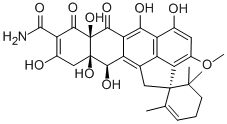Viridicatumtoxin in a mycotoxin originally isolated from Penicillium that has diverse biological activities, including antimicrobial, cytotoxic, and toxic properties. It inhibits the growth of B. subtilis, M. luteus, C. perfringens, B. fragilis, and methicillin-resistant S. aureus (MRSA; MICs = 0.39-1.56 μg/ml), as well as C. albicans, S. cerevisiae, M. racemosus, A. niger, and P. chrysogenum (MICs = 6.2-25 μg/ml), but has no activity against M. smegmatis, E. coli, K. pneumoniae, P. aeruginosa, or S. marcescens (MICs = >100 μg/ml). Viridicatumtoxin inhibits the production of polyprenyl alcohols by S. aureus undecaprenyl pyrophosphate (UPP) synthase, E. coli octaprenyl pyrophosphate synthase (OPS), and S. cerevisiae dehydrodolichyl pyrophosphate (DedoIPP) synthase in vitro (IC50s = 3.1, 21, and 71 μM, respectively). It has cytotoxic effects against human Jurkat T (IC50 = 4.92 μM), chronic lymphocytic leukemia (CLL; LC50 = 0.7-3.5 nM), and bone marrow-derived HS-5 stromal cells. Viridicatumtoxin is toxic to rats and mice when administered intraperitoneally (LD50s = 80 and 90 mg/kg, respectively) and to rats when administered via gastric intubation (LD50 = 122.4 mg/kg), but not to rats or mice when administered orally or through subcutaneous injection.

